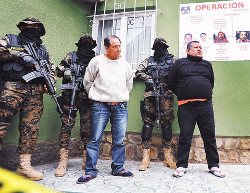Bolivia’s capture of two Peruvians who allegedly worked for the Tijuana Cartel highlights Bolivia’s central role in the region’s cocaine “air bridge,” and raises the possibility that the once-mighty Mexican crime group still has some international reach.
The Peruvians, Percy Santos Santillan and Sosimo Teofanes Bermudo Crepo (whose Bolivian identification provided him with another name) worked as intermediaries for Mexico drug trafficking group the Tijuana Cartel, local press quoted Bolivia’s Minister of Government Hugo Moldiz as saying. He also said the two coordinated aerial shipments of cocaine traffickeed between Peru and northern Bolivia.
Bolivia’s anti-drug trask force, the FELCN, was able to capture the two Peruvians thanks to intelligence shared under a cooperation agreement signed by Peru and Bolivia in October 2014. Santillan and Bermudo are wanted by Interpol as well as in their home country, where they are accused of smuggling cocaine out of Peru’s Apurimac, Ene and Mantaro River Valleys (a region known as the VRAEM), according to reports.
Moldiz emphasized that the arrest of the alleged Tijuana Cartel operators did not mean foreign drug trafficking cartels are present in Bolivia, describing the two as “emissaries.”
InSight Crime Analysis
Bolivian officials have typically been careful to draw a distinction between the drug cartel “emissaries” they say are coordinating drug shipments in the country, versus the well-established presence of foreign drug cartels. As InSight Crime reported last year in a special investigation on Bolivian organized crime, local, family clans control much of Bolivia’s underworld, while Colombian groups handle much of the transnational drug trade.
The capture of Santillan and Bermudo follows the arrest of Alberto Santillan Zamora, alias “Chang,” in July 2014. Santillan’s Peru-based group allegedly supplied the Tijuana Cartel with cocaine, shipped to Mexico via sea routes.
The Tijuana Cartel is a shell of what it used to be — all of its founding members have been killed and captured, and the organization came out badly fragmented following its violent war with the Sinaloa Cartel. The arrest of these alleged associates in Peru and Bolivia suggests that although weakened at home, the Tijuana Cartel could be expanding its international presence. The precise nature of the connections between the two Peruvian detainees and the Tijuana Cartel, however, is unclear — they may have been coordinating drug shipments on the Mexican group’s behalf, but could not really be considered full-fledged members of the group.
The arrest also underlines Bolivia’s role in the air bridge used by traffickers to move cocaine from Peru to Brazil. On top of being a coca producing nation, Bolivia is now seen as a major hub for drugs being shipped to the world’s second largest consumer, Brazil, as well as onwards towards Europe, often via West Africa. In response, Peru and Bolivia have been searching and destroying clandestine airfields and have both enacted controversial shoot-down laws, with Peru reportedly downing a plane in early March.

